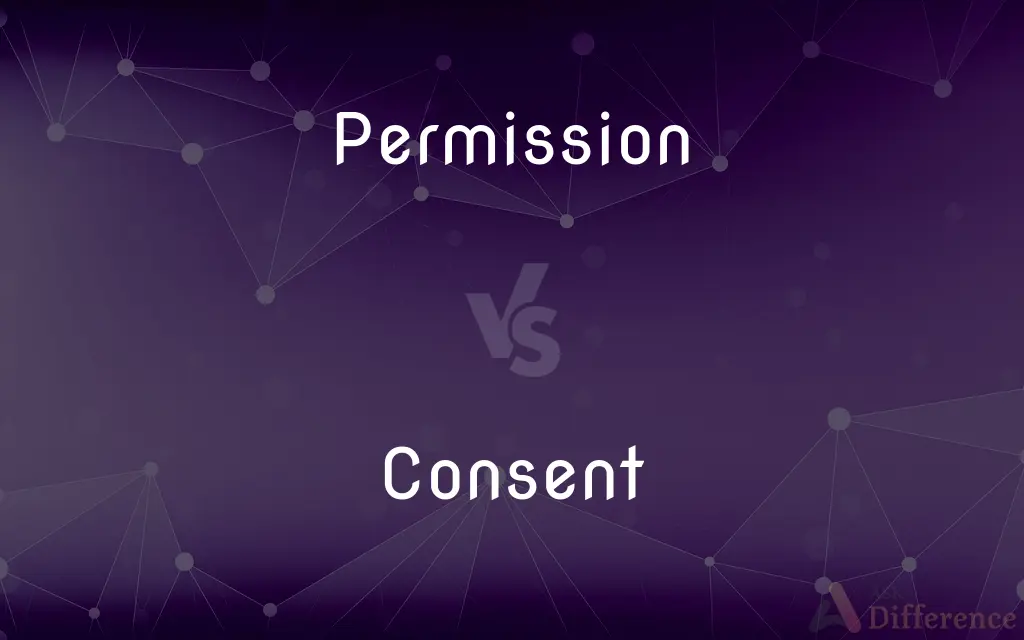Permission vs. Consent — What's the Difference?
Edited by Tayyaba Rehman — By Maham Liaqat — Updated on April 19, 2024
Permission implies a formal authorization from an authority, while consent involves agreement, often in a personal or legal context.

Difference Between Permission and Consent
Table of Contents
ADVERTISEMENT
Key Differences
Permission typically comes from someone in a position of authority, such as a manager or a parent, authorizing someone to take a specific action. On the other hand, consent is more about mutual agreement and is essential in contexts involving personal rights or data.
Permission is often formal and may require documentation or official approval to be valid. Whereas consent can be less formal, sometimes verbal or implied, depending on the situation.
In legal contexts, permission is required from regulatory bodies or institutions, establishing a framework for actions like building constructions or business operations. On the other hand, consent is crucial in legal matters involving personal choices, such as medical treatments or data sharing.
In educational settings, students often need permission from teachers or administrators to participate in certain activities or access certain areas. Conversely, consent plays a role when handling students' personal information or making decisions that affect their welfare.
In the workplace, employees might need permission to access certain resources or take leave. Meanwhile, consent is required for personal matters, such as participation in voluntary programs or agreement to changes in employment terms.
ADVERTISEMENT
Comparison Chart
Source
Authority figure or institution
Individual or group involved
Formality
Typically formal and documented
Can be formal or informal, often less documented
Context
Often institutional or organizational
Personal or legal
Necessity in Interaction
Required for approval to perform actions
Necessary for agreement on personal matters
Legal implications
Often linked to compliance and regulations
Tied to rights and personal autonomy
Compare with Definitions
Permission
Authorization granted by an authority to undertake an action.
He received permission from the city council to start his new building project.
Consent
Legal acknowledgment and acceptance of terms.
The patient must sign a consent form before surgery.
Permission
A formal consent usually documented or official.
The company obtained permission from the government to export its products.
Consent
The act of agreeing to something proposed by another.
They gave their consent for their child to go on the school trip.
Permission
The allowance to do something not typically permitted.
She got special permission to enter the restricted area.
Consent
Voluntary agreement to participate in an activity or process.
He gave his consent to join the company's new training program.
Permission
A requirement in various settings to avoid penalties or denial.
Without permission, he could not participate in the field trip.
Consent
Essential for ethical validity in personal or sensitive matters.
Obtaining consent is crucial before sharing personal information.
Permission
The approval to use or access specific resources or areas.
Students need permission to access the laboratory after hours.
Consent
Agreement or approval by an individual for something to happen.
She gave her consent for her medical records to be used in the study.
Permission
The action of officially allowing someone to do a particular thing; consent or authorization
They had entered the country without permission
He received permission to go to Brussels
Consent
Permission for something to happen or agreement to do something
No change may be made without the consent of all the partners
Permission
The act of permitting, especially in giving formal consent; authorization
Do they have permission to leave?.
Consent
Give permission for something to happen
He consented to a search by a detective
Permission
An authorization to do something, as to quote from a book under copyright.
Consent
To give assent, as to the proposal of another; agree
Consent to medical treatment.
Consent to going on a business trip.
Consent to see someone on short notice.
Permission
Authorisation; consent (especially formal consent from someone in authority)
Sire, do I have your permission to execute this traitor?
Consent
(Archaic) To be of the same mind or opinion.
Permission
The act of permitting.
Consent
Acceptance or approval of what is planned or done by another; acquiescence.
Permission
(computing) Flags or access control lists pertaining to a file that dictate who can access it, and how.
I used the "chmod" command to change the file's permission.
Consent
Agreement as to opinion or a course of action
She was chosen by common consent to speak for the group.
Permission
(transitive) To grant or obtain authorization for.
Consent
(intransitive) To express willingness, to give permission.
After reflecting a little bit, I've decided to consent.
Permission
The act of permitting or allowing; formal consent; authorization; leave; license or liberty granted.
High permission of all-ruling Heaven.
You have given me your permission for this address.
Consent
To cause to sign a consent form.
Permission
Approval to do something;
He asked permission to leave
Consent
To grant; to allow; to assent to.
Permission
The act of giving a formal (usually written) authorization
Consent
To agree in opinion or sentiment; to be of the same mind; to accord; to concur.
Consent
Voluntary agreement or permission.
Consent
(obsolete) Unity or agreement of opinion, sentiment, or inclination.
Consent
(obsolete) Advice; counsel.
Consent
To agree in opinion or sentiment; to be of the same mind; to accord; to concur.
And Saul was consenting unto his death.
Flourishing many years before Wyclif, and much consenting with him in jugdment.
Consent
To indicate or express a willingness; to yield to guidance, persuasion, or necessity; to give assent or approval; to comply.
My poverty, but not my will, consents.
And whispering "I will ne'er consent," - consented.
Consent
To grant; to allow; to assent to; to admit.
Interpreters . . . will not consent it to be a true story.
Consent
Agreement in opinion or sentiment; the being of one mind; accord.
All with one consent began to make excuse.
They fell together all, as by consent.
Consent
Correspondence in parts, qualities, or operations; agreement; harmony; coherence.
The melodious consent of the birds.
Such is the world's great harmony that springsFrom union, order, full consent of things.
Consent
Voluntary accordance with, or concurrence in, what is done or proposed by another; acquiescence; compliance; approval; permission.
Thou wert possessed of David's throneBy free consent of all.
Consent
Capable, deliberate, and voluntary assent or agreement to, or concurrence in, some act or purpose, implying physical and mental power and free action.
Consent
Sympathy. See Sympathy, 4.
Consent
Permission to do something;
He indicated his consent
Consent
Give an affirmative reply to; respond favorably to;
I cannot accept your invitation
I go for this resolution
Common Curiosities
In what scenarios is consent crucial?
Consent is crucial in medical procedures, data privacy issues, and any personal interactions that affect autonomy.
Can a minor give consent?
Minors typically cannot give legal consent; instead, parental permission or legal guardian consent is required.
Can consent be withdrawn?
Consent can be withdrawn at any time, and once withdrawn, any continuation of the consented action becomes unauthorized.
Is permission revocable?
Yes, permission can be revoked by the authority that granted it, depending on the circumstances.
What are common contexts where permission is required?
Permission is commonly required in educational settings, workplaces, and for compliance with regulations.
What legal documents are commonly used to record permission?
Contracts, permits, and official letters are common documents used to record permission.
What forms are used to establish consent?
Consent forms, agreements, and verbal confirmations are typical methods of establishing consent.
What role does permission play in online settings?
Online, permission is often required to access certain functionalities or personal data, in line with privacy regulations.
Does consent imply endorsement?
Consent implies agreement and acceptance but not necessarily endorsement of the underlying values or beliefs.
How is consent verified?
Consent is verified through written agreements, recorded verbal agreements, or explicit actions indicating approval.
Why is consent important in relationships?
Consent is essential in relationships to ensure that all interactions are based on mutual agreement and respect.
How does permission differ in professional vs. personal contexts?
In professional contexts, permission often involves formal procedures and documentation, whereas in personal contexts, it may be less formal.
What happens if someone violates a permission granted to them?
Violating granted permission can lead to disciplinary actions, legal consequences, or termination of the permission.
How are disputes over permission resolved?
Disputes over permission are typically resolved through legal or administrative channels, depending on the nature of the permission.
What are the ethical implications of not obtaining consent?
Ethically, failing to obtain consent can lead to breaches of trust, respect, and integrity, and can damage relationships and reputations.
Share Your Discovery

Previous Comparison
Ash vs. Ashen
Next Comparison
Flex vs. TwistAuthor Spotlight
Written by
Maham LiaqatEdited by
Tayyaba RehmanTayyaba Rehman is a distinguished writer, currently serving as a primary contributor to askdifference.com. As a researcher in semantics and etymology, Tayyaba's passion for the complexity of languages and their distinctions has found a perfect home on the platform. Tayyaba delves into the intricacies of language, distinguishing between commonly confused words and phrases, thereby providing clarity for readers worldwide.















































